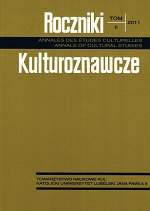Racjonalizm kultury intelektualnej Johna Locke'a
John Locke's Rationalism of Intellectual Culture
Author(s): Stanisław JaneczekSubject(s): Cultural Essay, Political Essay, Societal Essay
Published by: Towarzystwo Naukowe KUL & Katolicki Uniwersytet Lubelski Jana Pawła II
Keywords: John Locke; rationalism; empiricism
Summary/Abstract: This paper seeks to discuss the problems of John Locke’s epistemology. Locke was a characteristic representative of the idea of the Enlightenment. This text focuses on a broader intellectual context of Enlightenment solutions that refer to socio-political issues and to one’s outlook. The structure of An Essay Concerning Human Understanding suggests that empiricism results from antinativism, nevertheless the logic of Locke’s considerations makes us agree that this solution is a systematic consequence of a more basic reasoning. It is difficult not to appreciate the importance of Locke’s reflection with regard to the assessment of human cognitive abilities. His assessment is made evident in the theory of knowledge, the importance of human praxis, and also in the specific character of his theory of science in the sense of modern natural history. This may lead to the distinction of two levels of his reflection on knowledge, i.e. the official level and the non-official level, in the form of normative and descriptive analyses, the analyses that deal with methods applied in scientific practice or beliefs formulated for the sake of practical life. The first level would correspond to ’hard’ empiricism, the kind of empiricism characteristic of the 2nd book of An Essay Concerning Human Understanding; the second level is found in book four: rationalism that dominates, however, even over the first approach. In this context there is a need to go beyond the legitimation of only the narrow circles of truths that belong to proper learned knowledge based on empiricism, such knowledge that is objectified and certain. We need to legitimise more modest convictions formulated on a rational basis, convictions with subjectivistic elements (“belief,” “assent”).
Journal: Roczniki Kulturoznawcze
- Issue Year: 2011
- Issue No: 2
- Page Range: 51-70
- Page Count: 20
- Language: Polish

